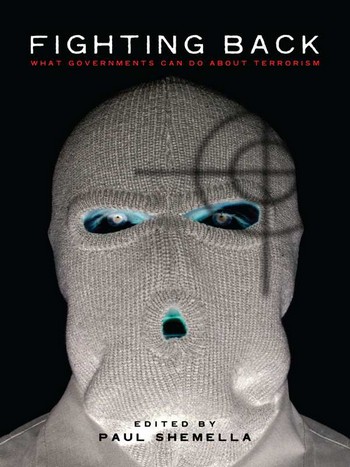The academic works listed on this website include a book entitled Fighting Back: What Governments Can Do About Terrorism. The other non-fiction books also discuss how governments might deal with such political violence. The threat of terrorism plagues most governments, but responses to the threat are complex and difficult. As a Navy SEAL, I planned and conducted special operations in Latin America, Europe, and the Middle East. As a lecturer, I have traveled all over the world to help other governments understand terrorism and counter terrorism. As a result, my fiction features those themes. As I have said, we can all learn a lot from fiction. This is especially true of terrorism, a set of activities that requires government officials to think beyond what is probable, imagining what is possible. The website is designed to help readers understand how governments can deal with current and future terrorist threats, merging non-fiction with fiction.
In order to fight back against terrorism, we must understand precisely what it is we are dealing with. Terrorism has many definitions (part of the problem), but most of us can agree that it is violence with political or ideological motivation intended to spread fear in a wide-ranging population. Governments that get this wrong do not craft successful responses to either the threat or the action. But terrorism is not really about the action; it is about the government’s reaction. It is easy for national leaders to make matter worse—and most of them do. Here are ten “precepts” for responding to terrorism that, if followed, will keep most governments on the right track.
- Develop a set of strategies for offense, defense, and prevention. The most important of these should be prevention.
- Prepare to use coercive force. This is not normally the first response, but it must be part of the package. Law enforcement and military forces that have the capacity to respond effectively can have a deterrent effect as well.
- Build consensus all around. We must fight the terrorists, not each other.
- Hold the moral high ground. Once it’s gone, it’s gone. Terrorists want us to be just like them. Don’t fall into that trap.
- Strengthen social cohesion. All human beings wish to belong to something larger than themselves. We must channel that desire into productive group participation, making the nation-state the ultimate group to be proud of.
- Build the institutional capacity needed to function quickly and effectively. This means adequate funds, training, equipment, and coordination with the rest of the government. Individuals cannot beat terrorism; only high-capacity institutions can win this fight.
- Improve all border security. There are many borders beyond the physical realm—airports, seaports, areo-space, maritime spaces, and cyberspace.
- Educate everyone. Citizenship comes with responsibilities. Public education inculcates those attitudes and actions all citizens must adopt in order to help their governments win the fight.
- Control the narrative. Successful terrorism relies on clever messaging. Governments must have better messages than the thugs who threaten them.
- Govern well. Terrorists wish to portray governments as corrupt and dysfunctional. Many governments help them do just that. The better a country is governed, the more prepared it is to prevent, defend, and respond.
Terrorism is associated with—but not necessarily aligned with—organized crime. Where the operational objectives of criminals and terrorists coincide, there is cooperation. Both threats are networked and can only be defeated by governments that can network—within their own institutions and among other governments. Countering terrorism is, all at once, a national, regional, and even global fight.


Trackbacks/Pingbacks